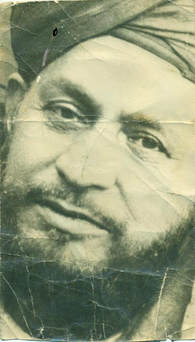 This week has been like a sucker punch to the gut. And it's not because, objectively, there was more tyranny in the world this week than last. But it's only human to feel punches that land close to home, especially in fights that you've been a part of, against opponents you've studied and come to know well. Separating children from families. The Muslim ban being upheld. The prospect of the highest court in the land stacked with judges who will presumably rule against oppressed people. This week, it happened in my lane. I would have liked to go into a legal analysis of the Muslim ban. Or explain how the government never had a plan, nor a procedure, to reunite the families they needlessly ripped apart. But it does little good except in lawyers' circles. I would have also liked to tell stories of clients I know who were affected by the ban, or the hopelessness when I tell them their asylum claim would likely be denied, or that yes, the law will keep changing, and it will probably get worse. Humanize, they say. Uplift the stories. People will be moved and there will be real change. But it seemed so hopeless. They don't see us as human beings. Why would they care? And then I remembered my grandfather. Which is strange, because I never met him. His name was Hakeem Maulvi Muhammad Chiragh-ud-Din. He was a traditional physician and became heavily involved in politics in pre-partition India. As a religious scholar, he held provincial chairmanship in the Jamiat Ulama-e-Hind (Organization of Religious Scholars of India) which, in the 1930's and 1940's, supported the Congress Party's vision of an undivided India and strongly endorsed the Gandhian vision of Hindu-Muslim unity. A fiery speaker in Urdu, Persian, and Punjabi, he was jailed frequently by the British raj for speaking out against colonial rule. (He spoke almost no English, but my father tells me he used the word "agitation" frequently.) However, polarization, division, and hatred on both sides made the partition of the Subcontinent nearly inevitable. After his release from prison in 1943, he turned down offers of political positions in India and, like 14 million others, fled to what would become Pakistan in what is still one of the largest, bloodiest, and traumatic forced displacement of refugees in history. On the 14th of August 1947, he spoke to his village as the first Pakistani flag (which my father spent the first night in his new country sewing) was hoisted. He reminded them that they had been minorities and were now a majority, the British were gone, and now the few Hindus and Sikhs that remained were their responsibility to protect. I found myself thinking about my grandfather this week. I wonder when he accepted that Hindu-Muslim disunity would split his native land, and how complicated his feelings toward his new country must have been. After Partition, he stepped down from politics and returned to the practice of medicine, never charging a single patient again until his death in 1957. I wonder what he would have made of Trump's America? I think he would have counseled to never stop speaking truth to power, even when you're going to lose. He would have continued to call for unity despite the fact that the two sides were killing each other. He would have related the time his elder son (my uncle) rode on Gandhi's shoulders as a 9 year old boy, at a time when Hindus and Muslims lived in complete segregation. (Imagine a white man drinking from the colored fountain.) He would have reminded the majority that it was their responsibility to ensure the rights of minorities were protected. He would have told us to find a way to serve others no matter what. He would have urged us to stick to principle, no matter what they called you. He would have told us to vote, as he had once urged the people of Sagar, India, keeping a yellow vote box to make sure no one was left out. He would have told us to not lose "himmat" (resolve) because we still have institutions and the majority. And I think he would have echoed Mahatma Gandhi and said simply, full effort is full victory.
0 Comments
Leave a Reply. |
AuthorHassan Ahmad, Esq. Archives
June 2018
Categories
All
|
 RSS Feed
RSS Feed